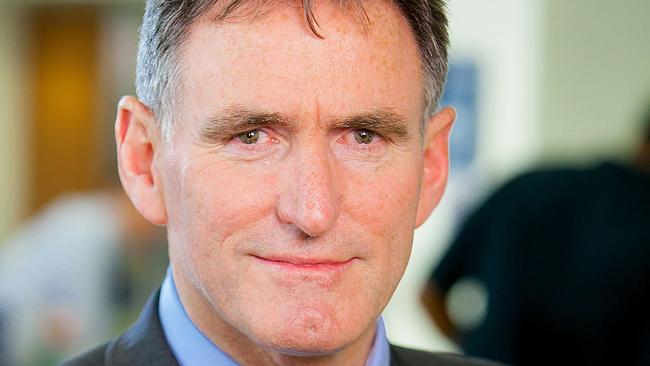
Those looking for further evidence outgoing RBS chief Ross McEwan is a good fit for National Australia Bank’s top job should seek out a speech he gave in October 2014.
It was delivered to the British Bankers Association’s annual conference a year after he took over, and during a scandal-plagued period for British banks.
RBS’s near-death experience during the global financial crisis remained top of mind. The wording of the speech is remarkably similar to what NAB’s shareholders would want to hear after a tumultuous period that claimed the jobs of chief Andrew Thorburn and chairman Ken Henry.
“We as an industry are in fact grappling with one big problem: a failure to put the customers’ interest at the heart of our business and its culture,” McEwan said at the time.
He went further: “In banking, trust is not a ‘nice to have’ — it is a commercial essential.”
McEwan also didn’t underestimate the scale of the task, telling his audience an eager staff member had suggested in his early CEO days he enact a 100-day plan to root out past problems and practices. “The truth is that I need a 500-day plan for that. I can’t draw the line until we know the line will hold. We must get through a slate of conduct and litigation issues at RBS.”
Other topics addressed were challenging the bonus culture, handling potential interest rate moves, forming a small business fund and becoming a “smarter and simpler bank”.
Those topics can all be superimposed neatly with what NAB confronts on a smaller scale.
Interestingly, the leading contender for the RBS top job is said to be Alison Rose, head of commercial and private banking and deputy chief of NatWest Holdings. She is already being dubbed the most powerful woman in UK banking.
One theory putting McEwan firmly in the frame for NAB CEO is that if Rose wins the RBS post, following a global benchmarking exercise, he will be released from his handcuffs much earlier.
McEwan, who is almost 62, announced his intention to step down in April but said he would stay on for as long as 12 months until a successor was in place. He told the media at the time he had no plans for his next move.
Those who know him well attest to McEwan’s ability. “He’s got cut-through,” a senior banking industry source told The Australian.
“He’s a circuit breaker and he’s done this execution job before.”
RBS chairman Howard Davies told the RBS annual general meeting McEwan’s “successful execution of the strategy” to refocus the bank on its core markets in Britain and Ireland helped deliver “one of the biggest UK corporate turnarounds in history”.
RBS returned to profit in 2017.
But the share price is lower than when McEwan took over, amid a competitive British market and fines being slapped on banks, including RBS, this year for cartel activity in foreign exchange markets.
Either way, NAB is moving forward with its CEO search and wants someone announced for the seat in coming months.
The other external candidates are said to include Medibank boss and former NAB finance chief Craig Drummond, Westpac institutional bank boss Lyn Cobley and outgoing Westpac customer chief and former NAB executive George Frazis. Internally, NAB business banking boss Anthony Healy and customer boss and former NSW premier Mike Baird are candidates.
Bluff or tough?
Former New Zealand prime minister Bill English had an honest take yesterday on whether tougher capital requirements across the ditch would see Australian banks retreat or pull back from lending in New Zealand.
“So far, for all the bluster over the last 15 years no Australian bank has taken its capital away, so what does that tell me? Don’t believe what they say. Watch what they do,” he quipped, telling a stockbrokers conference in Sydney the Australian banks were calling New Zealand’s bluff.
While English is removed from current deliberations, he said he saw merit in the higher capital requirements being proposed by the Reserve Bank of New Zealand as long as banks remained focused on risk management.
“All you can do is gradually push that boundary back from the assumption — which is deep-seated in Australia — that the sovereign guarantees the banking system,” he said. “These outfits (banks) can do serious damage to a country … they stuff the sovereign balance sheet and it can take a long time to get that sorted out.”
It’s a work in process, though, for New Zealand policymakers. The RBNZ has received 164 responses and submissions on its new capital rules as well as feedback through briefings.
UBS has been a staunch critic of the proposed requirements, labelling them “unnecessary and potentially damaging” and warning they could prompt Australia’s major banks to cut dividends.
The next step is that submissions will be collated and published alongside a summary in June, followed by an announcement by November 30.
Implementation is scheduled to begin from April, but the RBNZ has already signalled this will be a multi-year transition.
The measures have already put capital management measures from the likes of ANZ — which has been divesting assets and stockpiling capital — and others on ice as they work through the numbers.
Australia’s banks account for about 88 per cent of New Zealand’s banking assets.



